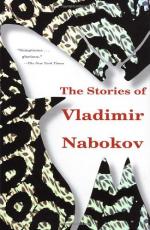|
This section contains 4,684 words (approx. 16 pages at 300 words per page) |

|
SOURCE: “Conspicuous Construction; or, Kristeva Nabokov, and The Anti-Realist Critique,” in Novel: A Forum on Fiction, Vol. 21, Nos. 2 & 3, Winter-Spring, 1988, pp. 330-39.
In the following essay, Ermarth examines the tension between reflexive and representational language in Nabokov's fiction and in the theories of Julia Kristeva, the French philosopher of language.
The conflict between realists and anti-realists re-enacts a powerful cultural habit of dualistic formulation. No sooner do we stop assuming representational values, a state aggravated, no doubt, by reading realistic novels, than we proceed to find reflexiveness everywhere; and, whether the shocking impulse is James Joyce or French philosophy, we proceed to apply that new norm with the same zeal once reserved for the old one. For those who thrive on the agony of combat my presentation will perhaps sound a dull note because I find no abyss between representation and reflexion, or between their counterparts, the symbolic and...
|
This section contains 4,684 words (approx. 16 pages at 300 words per page) |

|


